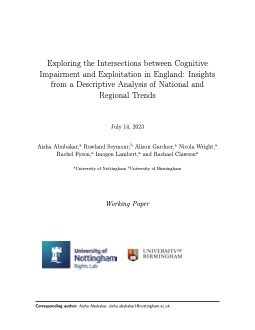By Tom Jackson, Rachel Crorken, Sheenik Mills, and Carla Ayrton
This report presents findings from a one-year process evaluation that explored the delivery of unpaid work in England and Wales. The qualitative research design included a total of 102 interviews with: people on probation (25), beneficiaries (6), probation staff (62), and members of the judiciary (9); six focus groups with unpaid work staff; and ethnographic observations of 18 unpaid work projects. The evaluation was designed to assess what works in the delivery of unpaid work following the unification of the probation service and the £93 million investment to aid unpaid work delivery following the Covid-19 pandemic. The main findings from the evaluation are: Identity and purpose of unpaid work • All staff interviewed, believed the purpose of unpaid work is first and foremost a punishment, but it must also have elements of reparation in which people on probation give back to the community. Overall, staff were confident that unpaid work was meeting its aims as a punishment, which they viewed as the time people on probation give up attending their order. Staff also thought that unpaid work met reparative aims by ensuring that work carried out benefits the wider community. • Perceptions on whether unpaid work is rehabilitative were mixed. Staff explained how unpaid work can be rehabilitative for some individuals by providing an opportunity to learn ‘soft’ and practical skills. However, the rehabilitative potential of unpaid work was not applicable to everyone and was dependent on employment status, the type of project, and the individual’s willingness to engage with rehabilitative efforts. People on probation’s experience of unpaid work • People on probation identified relationships with supervisors as an important factor that affected their experience of unpaid work. A good relationship with a supervisor could encourage them to return and attend projects led by the same supervisor. Meaningful projects could increase compliance by encouraging people on probation to return to projects they believed had value. These were usually described as projects that would have benefits for the local community, and/or where people on probation had the opportunity to learn new skills, particularly if they thought these could lead to employment. • Many people on probation brought up communication issues they had with probation practitioners. These communication issues could make completing hours of unpaid work difficult either because their unpaid work hours were not set up in time or because people on probation could not contact probation to discuss issues they had with attending projects, making it hard to rearrange hours. • Many people on probation who were interviewed felt that wearing high-visibility vests, with unpaid work branding, caused them to experience unnecessary stigma and shame which could have negative impacts on their mental health. People on probation and supervisors thought, in particularly public areas, having to wear the branded high-visibility vests could impact compliance
Ministry of Justice Analytical Series
London: Ministry of Justice, 2024. 76p.


